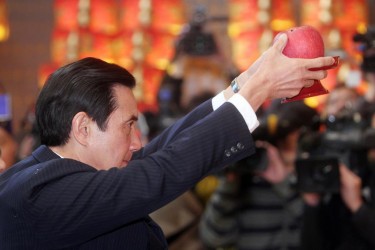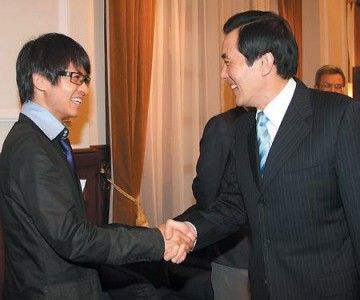To what extent does a distinctive Confucian culture exist – and is it incompatible with civic and democratic values? This is the topic of enquiry of Doh Chull Shin’s book, Confucianism and Democratization in East Asia, which focuses on the “Confucian Asian” countries of China, Japan, Korea, Singapore, Taiwan and Vietnam. Its main conclusion is that while a Confucian heritage is incompatible with Western style liberal-procedural democracy for its emphasis of community welfare over freedom of individual citizens, it could be reformulated into a communitarian democracy for its support of strong families which promotes trust and tolerance in the broader society.
In May this year, a debate about the relationship between Chinese culture and democratic civic life in Taiwan was sparked by Han Han’s visit there. As mainland China’s most popular blogger, his blog post, Winds of the Pacific (translated by the South China Morning Post), garnered much responses from both sides of the Taiwan Strait. He depicted the kindness and sincerity of the Taiwanese he encountered, like a taxi driver who drove back to Han Han’s hotel to return his mobile phone that he left on the cab, and contrasted this with the disappearance of deep-rooted Chinese virtues on the mainland:
I live in a country that has been through decades of political movements and harsh struggles. It sometimes seems we are now destined for a prolonged era of greed and selfishness.
I need to thank Hong Kong and Taiwan for protecting Chinese culture. They have preserved the virtues of the Chinese people, preventing many deep-rooted qualities from being destroyed.
Culture, a legal system and freedoms are the mainstays of a nation. People in other countries will not respect us simply because our new money can buy up all their super sports cars and ultra-luxury pleasure cruisers.
The post attracted so much attention that Taiwanese President Ma Ying-Jeou mentioned it in his inaugural address on 20 May 2012. He cites Han Han’s experience as reflections that kindness and honesty, core values of Chinese culture, are well and alive in Taiwan. He further links these traditional virtues with civic spirit and democracy:
Taiwan has three cultural traits: First, civic spirit is deep-rooted; second, traditional culture is well preserved; and third, the links and transitions between tradition and modernity are sophisticated. Democracy has made our civil society what it is today. It is a civil society in which the atmosphere of openness and the spirit of freedom have become the soil that nurtures creativity. In this soil of openness and freedom, we have not only preserved traditional culture – such as Taiwanese opera and glove puppetry – but have also developed contemporary cultural brands, such as the Cloud Gate Dance Theatre and the Ju Percussion Group. On the one hand, we are pursuing high technology and internationalization; while on the other, we also champion grassroots access to cultural activities.
Both Han Han and President Ma have portrayed Taiwan as a society deeply rooted in Chinese culture and at the same time steeped in Western civic democratic values. But what is left unclear is whether there is a connection between the two. A number of writers think that they have confused civic virtue for traditional Chinese virtue.
Taiwanese writer Lin Shu Shu, for example, thinks that the kindness that Han Han experienced in Taiwan has nothing to do with traditional Chinese culture; rather, it is the result of a developed civil society. He starts from a short tour of Taiwan’s history:
1895年日本殖民者踏上台灣之時,發現這個是治安極差、衛生水準低下、纏足、吸食鴉片,滿街流氓地痞,識字率不到總人口3%的地區,此時期的台灣就是同時期中國的縮影。而法治的基礎是在日本殖民的五十年下所奠定,台灣的地方選舉、自治與公民參政權的出現是在1935年,是由蔣渭水等人與台灣文化協會(1921年成立)不斷向殖民者請命所爭取到的。但是台灣的公民素質提升可說是到了1990年代,民主的落實、資訊開放和網際網路出現之後的事情。
中華傳統美德更是個偽命題,我們說德國文化、美國文化、阿茲特克文化、埃及文化、東南亞文化,又可曾見到美德一說?美德其實只是一種不曾存在的想像。
所以,我的看法與漢民族主義者正好相反,正是自由的氛圍,讓中華文化能活在台灣的公民文明底下,而不會侵犯到公民社會。因此,如果一地阻擋了公民社會的發展,卻在這種不自由的情境下推崇一個極具封建色彩的傳統文化,這等於是在幫新威權主義招安。
This viewpoint is echoed by well-known mainland Chinese columnist Jia Jia (twitter: @jijia), who thinks the “Taiwan experience” has its own unique origin, unconnected with Chinese culture:
对于台湾期待,我并不是说这种期待有什么错,而是这种期待可能会模糊掉我们自己面临的真正问题。所谓“台湾经验”有其非常特殊的原因,在人类的政治文明演进过程里找不到第二个这样的例子。在真正了解中国大陆之后,我发现所谓的“中国国情”的确存在,它绝对不是一个借口,台湾的经验或者模式,完全不可能适用于大陆。

President Ma Ying-jeou paying respect in Taipei's Chih Nan Temple during the Chinese New Year, shortly after being elected for a second term in 2012. Photo from his Google+ Account.
I’m not saying that there is anything wrong with this admiration for Taiwan. I’m saying that this admiration may obscure the real problems that [mainland China] are facing. The so-called “Taiwan experience” has its very unique origins, and we cannot find a second example in the history of humanity’s political evolution. After gaining a real understanding of mainland China, I find that the oft-cited “specific national conditions of China” really exist. It is by no means an excuse. The Taiwan model is impossible to be applied in mainland China.
这样说也许会被很多朋友批评,看上去似乎很让人泄气。然而的确如此,被我们寄予厚望的台湾不可能施加太多的影响过来。台湾的中国味道,只是一种外面的味道,如果细细品尝,还会发现其本质并不是儒家文化或者中国文化的传承,她有着另外的思想以及道德资源,成为一个多元并存的文化体系,只是我们去了只看到所谓传统的一面而已。
Taiwanese student Zhang Junkai goes one step further and calls for a more sincere mutual understanding between the two sides of the Strait. He thinks Han Han’s article only reinforces the stereotypical view of Taiwan’s political superiority over the mainland, which could be misleading:
其实,很多人将内心对欧美体制的欣赏,投射在台湾身上;将内心对大陆内部问题的不满,也投射到台湾身上。抱著投射心态来到台湾,就像戴著一副有色眼镜,不能敞开心胸的认识台湾,只能处心积虑地来找寻“桃花源”(或是“民主灯塔”、“自由宝岛”,甚或是“一个民族的一切”)。
This debate has brought together the relationship between culture and democracy, and the contrast between Taiwan and mainland China. In Doh Chull Shin’s account, Confucian culture can be helpful to democracies by fostering trust and tolerance in the broader society, as what Han Han has observed in Taiwan. But regimes could also exploit culture by cultivating non-liberal values among citizens with superior economic performance and sophisticated propaganda, so people would support democracy only as a brand name but not in its essence, as in mainland China under the guise of paternalistic meritocracy.
But Shin’s findings also imply that authoritarian systems are vulnerable to crises of legitimacy. When their performance falters, citizens tend to demand more democratic governments. The replacement of the discredited one-party rule in Taiwan by democracy is a case in point. In the final analysis, in Taiwan as in mainland China, culture is likely only part of the explanation, as Andrew Nathan concludes in a recent review of Shin’s work in Foreign Affairs:
Culture interacts with socioeconomic forces, political institutions, regime performance, and leadership to determine the fate of regimes, with no single factor serving as the master cause. The Asian values hypothesis is wrong in its claim that democracy cannot work in Asia. So, too, however, is the counterargument that modernization will automatically doom the region's authoritarian regimes. They may survive for a long time to come. But the cultural odds are stacked against them.








2 comments
I am doing research on Confucias values and ethics in the Chinese military and would welcome comments and links to sites writing on this topic. It will be especially helpful if I can get information on Chinese peacekeepers obligations to act out the moral teachings and obligations of Confucianism in peacekeeping areas. There has also been talks on a connection between Confuciansim and the African philosophy of Ubuntu. How does one, for example, coalesce these two philosophies into an understanding of peacekeeper’s role in mission areas and their interaction with the local population. Both philosophies emphasize the moral good to the community, peaceful co-existence and humanism.
Concrete evidence and eye witness reports on peacekeeper’s R2P and strategic culture will be most welcome.